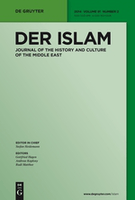
ISLAM-ZEITSCHRIFT FUR GESCHICHTE UND KULTUR DES ISLAMISCHEN ORIENTS
Scope & Guideline
Chronicling the Evolution of Islamic Thought and Culture
Introduction
Aims and Scopes
- Interdisciplinary Approaches to Islamic Studies:
The journal employs a variety of methodologies, including historical analysis, sociological inquiry, and ethnographic research, to examine the interplay between Islam and various cultural, social, and political contexts. - Focus on Contemporary Issues:
It emphasizes contemporary challenges facing Muslim communities, such as Islamophobia, gender issues, and the impact of global crises like the COVID-19 pandemic on Islamic practices and identities. - Exploration of Identity and Culture:
The journal investigates the dynamics of identity formation within Muslim communities, addressing how cultural practices, religious beliefs, and social structures interact and evolve in different contexts. - Critical Examination of Religious Authority:
There is a consistent focus on the roles of religious authorities and institutions, exploring how they influence social norms, ethics, and community practices within the Islamic world. - Attention to Gender Dynamics:
The journal highlights the experiences and roles of women in Islamic contexts, shedding light on issues such as female empowerment, child marriage, and the intersection of gender with religious practices.
Trending and Emerging
- Impact of Global Crises on Muslim Communities:
Recent publications increasingly examine how global crises, such as the COVID-19 pandemic, impact Muslim practices, community interactions, and religious observances, highlighting resilience and adaptation. - Islamophobia and its Consequences:
There is a growing body of work addressing the rise of Islamophobia, particularly in Western contexts, and its implications for Muslim identity, community cohesion, and political engagement. - Ethics and Morality in Contemporary Islam:
Emerging discussions on ethics, particularly regarding new technologies and social practices, reflect a contemporary reevaluation of Islamic moral frameworks and their application in modern contexts. - Youth Engagement with Islam:
Research focusing on the experiences and perspectives of young Muslims is on the rise, exploring issues of identity, activism, and the negotiation of cultural and religious expectations. - Intersectionality in Islamic Studies:
There is an increasing emphasis on intersectional approaches that consider how various social categories, such as gender, ethnicity, and class, interact and shape the experiences of Muslims in diverse contexts.
Declining or Waning
- Traditionalist Perspectives on Islam:
There has been a noticeable decrease in papers focusing solely on traditionalist interpretations of Islam, as more contemporary and critical perspectives gain traction. - Historical Analysis of Classical Islamic Texts:
While still important, the emphasis on classical texts and historical figures appears to be less prevalent, with a shift towards modern applications and interpretations of Islamic thought. - Focus on Sectarian Conflicts:
The exploration of sectarian conflicts within Islam, though still relevant, seems to have less emphasis compared to emerging themes that tackle broader societal issues and inter-community relations. - Studies on Islamic Governance Models:
Research centered on traditional Islamic governance models has waned, as there is a growing interest in contemporary political dynamics and the role of Islam in modern governance. - Narrow Regional Studies:
There is a decline in studies focusing narrowly on specific regions or countries, with a trend towards more comparative and global analyses of Islamic culture and society.
Similar Journals

Sirnak University Journal of Divinity Faculty
Unlocking New Dimensions in the Study of DivinityWelcome to the Sirnak University Journal of Divinity Faculty, a premier open-access journal dedicated to the exploration of diverse theological, philosophical, and cultural issues within the realm of religious studies. Published by Sirnak University, this journal has been freely accessible since 2010, ensuring that scholars, professionals, and students can engage with high-quality research without barriers. With an emphasis on interdisciplinary approaches and innovative perspectives, the Sirnak University Journal of Divinity Faculty aims to foster academic discourse and contribute to the broader understanding of divinity and related disciplines. Though the journal is relatively new, it strives to establish a significant presence in the field by welcoming original research articles, reviews, and theological reflections from researchers worldwide. Join us in advancing the academic study of divinity and enriching the scholarly community.
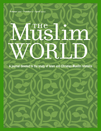
MUSLIM WORLD
Advancing Interdisciplinary Insights into the Muslim ExperienceThe Muslim World is a prestigious peer-reviewed journal published by Wiley, focusing on the intricate relationships and contributions of Islam within various domains of humanities and social sciences. With its roots tracing back to 1911 and converging until 2024, the journal encompasses an expansive historical perspective, enriching the understanding of Islamic culture, history, and its contemporary political significance. The journal holds a commendable impact in the field, as evidenced by its Q1 ranking in History and Religious Studies, and notable positions in Political Science and Sociology categories, signifying its substantial influence among researchers and academics. While operating under a subscription model, The Muslim World remains a crucial platform for fostering scholarly dialogue, promoting innovative research, and disseminating pivotal findings in its areas of study. With an ISSN of 0027-4909 and an E-ISSN of 1478-1913, it is committed to advancing knowledge within the framework of interdisciplinary studies, appealing to seasoned scholars and emerging researchers alike.

Hawwa
Navigating the Intersections of Gender and Culture.Hawwa is a distinguished academic journal published by BRILL, focusing on the intersections of culture, gender, and society. Established in the Netherlands, this journal has been a crucial platform for scholarly discourse since its inception in 2003. With an ISSN of 1569-2078 and an E-ISSN of 1569-2086, it serves as a vital resource for researchers and students alike, exploring the complexities of gender dynamics within various cultural contexts. In the rapidly evolving fields of Cultural Studies, Gender Studies, and Sociology and Political Science, Hawwa has achieved significant recognition, reflected in its 2023 Quartile Rankings (Q2 in Cultural Studies, Q3 in both Gender Studies and Sociology/Political Science) and commendable positions in the Scopus rankings. Although not an open-access journal, Hawwa maintains a commitment to fostering academic excellence and interdisciplinary dialogue, making it an essential read for those engaged in contemporary social theory and cultural analysis.
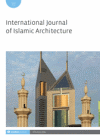
International Journal of Islamic Architecture
Bridging Cultures Through Architectural InnovationThe International Journal of Islamic Architecture, published by INTELLECT LTD in the United Kingdom, is a pivotal scholarly resource dedicated to the exploration of Islamic architecture, design, and cultural expressions within a contemporary framework. With ISSN 2045-5895 and E-ISSN 2045-5909, this journal targets an interdisciplinary audience by bridging the gap between architecture, geography, urban studies, and the arts. Established in 2012, it has swiftly garnered recognition, achieving notable rankings such as Q3 in Architecture and Q2 in Visual Arts and Performing Arts by 2023. Although it currently does not offer open access, its articles are meticulously peer-reviewed, ensuring high academic standards and relevance. Emphasizing the significance of Islamic architectural heritage in global contexts, the journal seeks to foster innovative perspectives and critical discourse, making it an essential platform for researchers, professionals, and students alike to engage with contemporary architectural practices and cultural dialogues.

Journal of Islamic Manuscripts
Documenting the Past, Inspiring the FutureJournal of Islamic Manuscripts is a prestigious academic journal published by BRILL, dedicated to the study and preservation of Islamic manuscripts from their historical, cultural, and artistic perspectives. With an ISSN of 1878-4631 and an E-ISSN of 1878-464X, this journal serves as a vital platform for researchers, professionals, and students interested in Cultural Studies, Visual Arts, and Performing Arts. Housed in the Netherlands, the journal boasts a commendable rank within Scopus, showcasing its significant impact within its fields—ranking #229 in Visual Arts and Performing Arts and #690 in Cultural Studies for 2023. Operating under a traditional subscription model, the journal ensures its contributions are accessible to a global audience dedicated to furthering the understanding of Islamic art and heritage. Spanning from its inception in 2010 through 2024, the journal promises to continue enhancing knowledge and appreciation of the diverse narratives encapsulated in Islamic manuscripts.
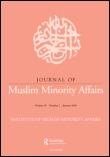
Journal of Muslim Minority Affairs
Empowering Minority Perspectives in Global DiscourseJournal of Muslim Minority Affairs, published by Routledge Journals, Taylor & Francis Ltd, stands as a pivotal platform in the realm of interdisciplinary research focusing on Muslim minority communities worldwide. With an ISSN of 1360-2004 and an E-ISSN of 1469-9591, this journal aims to explore critical issues of identity, cultural integration, and socio-political dynamics affecting these communities. It boasts a commendable impact factor and is strategically positioned within various academic quartiles: Q3 in Anthropology and Sociology and Political Science, alongside Q2 in Cultural Studies, demonstrating its comprehensive engagement in these fields. Researchers and practitioners can access a wealth of qualitative and quantitative studies, enhancing understanding and awareness of minority rights, cultural expressions, and political representation. With historical convergence from 1996 and a breadth of subjects relevant to today’s global discussions, the Journal of Muslim Minority Affairs is essential for scholars, professionals, and students interested in the complexities surrounding Muslim minorities.
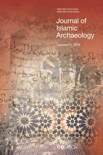
Journal of Islamic Archaeology
Unearthing the Secrets of Islamic SocietiesJournal of Islamic Archaeology is a distinguished publication dedicated to advancing the field of archaeology through the lens of Islamic heritage and culture. Published by EQUINOX PUBLISHING LTD, this journal provides a platform for researchers, professionals, and students to disseminate their findings and engage in critical dialogue regarding the archaeological aspects of Islamic societies from 2014 to the present. With an ISSN of 2051-9710 and E-ISSN 2051-9729, the journal is indexed within significant academic databases and positioned notably in the Q3 and Q2 quartiles for archaeology in the Arts and Humanities and Social Sciences categories, respectively. The journal fosters scholarly exchange and innovation, drawing attention to the rich tapestry of Islamic archaeology, and securing its role as an essential resource for practitioners and academics alike. Its commitment to rigorous peer-review and high-quality contributions ensures a valuable repository of knowledge, enhancing the understanding of an often underrepresented field in archaeology.

Al-Jamiah-Journal of Islamic Studies
Cultivating Excellence in Islamic Academic InquiryAl-Jamiah: Journal of Islamic Studies is a distinguished scholarly journal published by Sunan Kalijaga State Islamic University in Indonesia. Established as an Open Access publication since 2005, it aims to foster the dissemination of knowledge in the field of Islamic studies, catering to a diverse audience of researchers, professionals, and students interested in the rich tapestry of Islamic culture, religion, and thought. With an impressive Q1 ranking in Religious Studies and a Q2 ranking in Arts and Humanities for 2023, the journal stands out as a vital resource with high visibility and impact, holding a prestigious position in Scopus ranks—40th out of 644 in Religious Studies and 12th out of 173 in General Arts and Humanities. Al-Jamiah's commitment to academic excellence is reflected in its rigorous peer-review process, ensuring the publication of high-quality research. Based in Yogyakarta, Indonesia, the journal welcomes contributions that explore innovative perspectives and interdisciplinary approaches to contemporary issues affecting the Islamic world.

Nazariyat-Journal for the History of Islamic Philosophy and Sciences
Advancing Knowledge in Islamic Philosophy and SciencesNazariyat-Journal for the History of Islamic Philosophy and Sciences, published by SCIENTIFIC STUDIES ASSOCIATION, is a leading academic journal dedicated to the exploration and dissemination of research in the history of Islamic philosophy and sciences. With an ISSN of 2528-8563 and E-ISSN 2547-9415, this journal has adopted an Open Access model since 2014, ensuring that valuable insights and scholarly work are readily available to a global audience. Situated in Istanbul, Turkiye, the journal serves as a vital platform for researchers, students, and professionals seeking to deepen their understanding of the rich intellectual traditions of Islamic thought. Although the HIndex is currently unavailable, the journal is committed to upholding rigorous academic standards while encouraging interdisciplinary dialogue. By bridging historical examination with contemporary relevance, Nazariyat plays an essential role in fostering a nuanced appreciation of Islamic intellectual heritage within the broader scientific community.

Afkar-Jurnal Akidah & Pemikiran Islam-Journal of Aqidah & Islamic Thought
Pioneering Research at the Intersection of Faith and ReasonAfkar-Jurnal Akidah & Pemikiran Islam-Journal of Aqidah & Islamic Thought is a premier academic journal published by University Malaya's Academy of Islamic Studies, dedicated to advancing the fields of Islamic thought and philosophy. Since its inception, it has rapidly gained recognition, achieving an impressive Q2 ranking in Philosophy and a Q1 ranking in Religious Studies as of 2023, reflecting its crucial contribution to scholarly discourse. With an increasing Scopus ranking, currently positioned at #187 out of 644 in Arts and Humanities - Religious Studies, it emphasizes the interdisciplinary nature of Islamic scholarship, catering not only to theologians but also to philosophers, sociologists, and cultural theorists. The journal welcomes articles that explore contemporary issues in Islamic thought while adhering to rigorous academic standards, providing a reflective platform for researchers, professionals, and students alike. Based in Kuala Lumpur, Malaysia, this journal operates under a commitment to open academic discourse, fostering an inclusive environment for groundbreaking research from various corners of the globe.